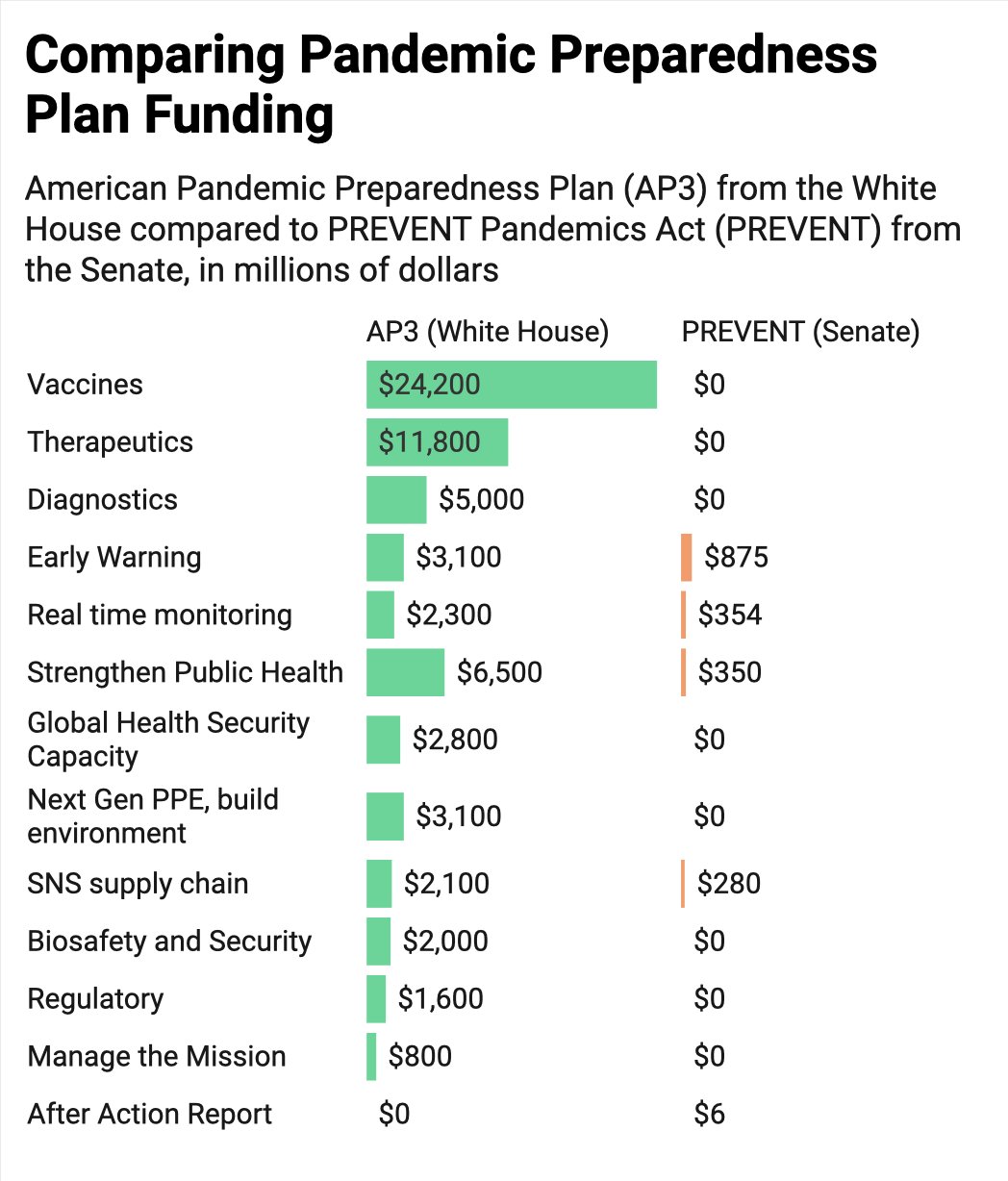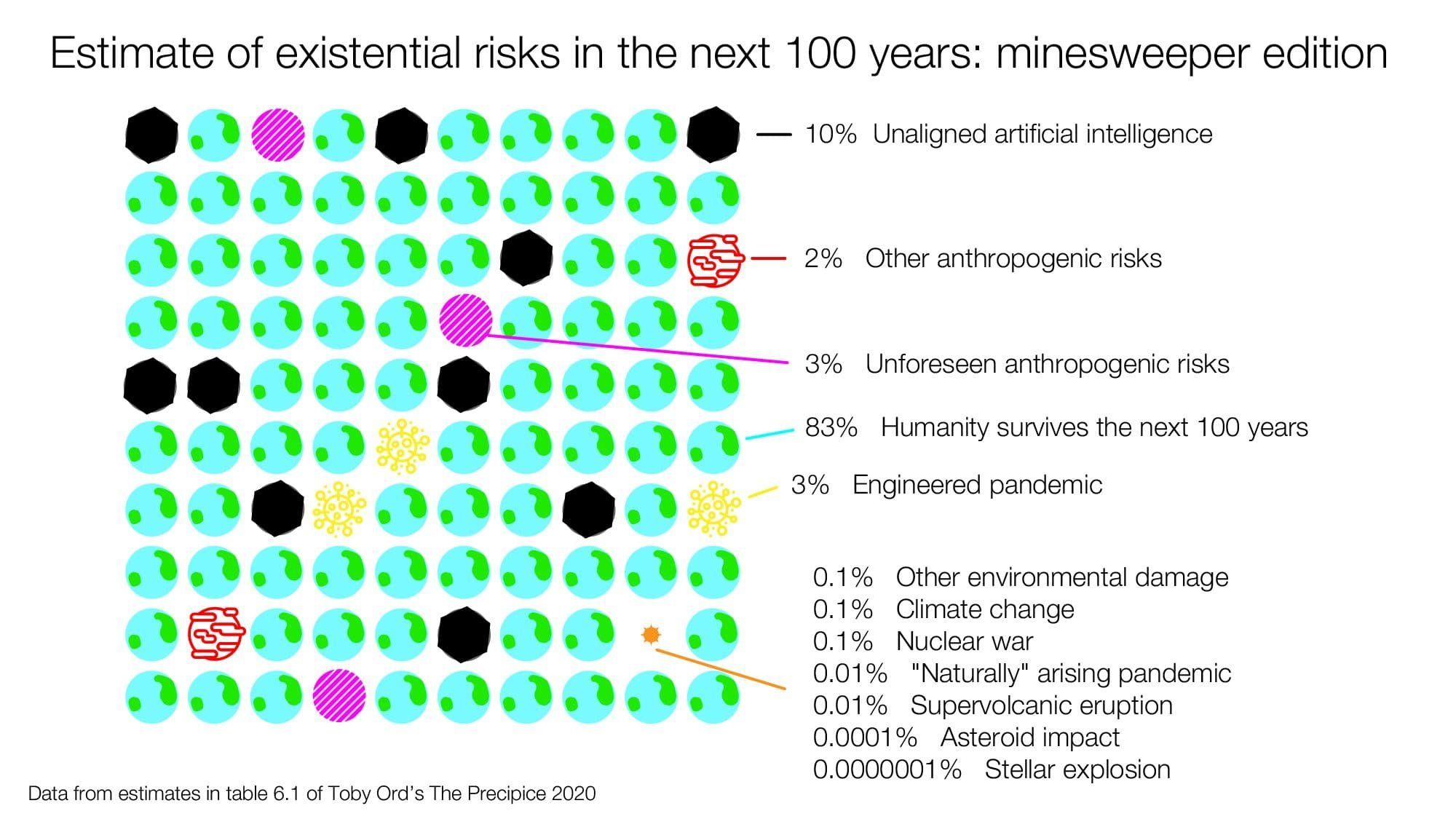Note: This is a linkpost from my new blog where I write much more casually and informally, and have a much higher chance of making some sort of error compared to my other more thoroughly vetted writing.
Intro
Alec Stapp and Caleb Watney, in founding their Institute for Progress, declared that "Progress is a Policy Choice". I agree, but I'm also worried about something a bit more simple - in addition to making progress, we also have to survive[1].
This survival is a policy choice too, and a choice we currently do not appear all that interested in making.
Vox explains "The US is about to make the same pandemic preparedness mistakes — again":
Several proposals attempt to estimate how much sustained funding is needed. The Bipartisan Policy Center included in its list of recommendations [...] $76 billion over 10 years once the funding is fully phased in. [...] The Biden White House laid out its own 10-year pandemic preparedness proposal, which a senior official likened to the Apollo moon missions, that requires $65 billion in total.
The Biden White House had originally asked Congress to make a $30 billion down payment on pandemic preparedness as part of its infrastructure plan.
But cognizant that it may be difficult to secure that much money in this reconciliation bill, given centrist Democrats’ concerns about the legislation’s overall cost [...]
And so, with centrists pressuring Democratic leaders to keep the bill’s costs down, Congress is preparing to pass a bill with a fraction of the funding experts say is necessary to prepare for the next pandemic, in what may be the last major legislation of this Congress. While more money could in theory pass later, public health experts worry an opportunity is being squandered.
That article was written in 2021 October. As of today, none of that money has passed into law, having been bundled into an omnibus bill getting staunch opposition due to concerns entirely unrelated to pandemic prevention spending[2].
The current proposal has slashed the original $65B to $2B:

...and even that $2B hasn't passed yet.
This isn't controversial: COVID was bad. The next pandemic could be much worse!
COVID has likely resulted in ~21M dead and has cost the world trillions of dollars in economic value.
The risk of the next pandemic - or even just the next COVID variant - is not going away. And the next pandemic could be much worse than COVID.
If we can turn airports into a modern security theater hellscape in response to September 11th, why can't we fund this necessary prevention?
And that's not all. Even funds to fight the current pandemic are drying up and soon we won't be able to fund tests or Paxlovid or other important things. This leads Rachel Cohrs to ask "Haven’t we learned anything?" Clearly no.
Much suffering was avoidable, again and again, if different choices that were available and plausible had been made at crucial turning points. By looking at them, and understanding what went wrong, we can hope to avoid similar mistakes in the future.
But will we?
Told You So
Back in 2015, Bill Gates called a pandemic the "predictable disaster in the history of the human race".
No one really listended to him, so he said the same thing again in 2017 and again in 2018).
Gates called for the US to make large investments, saying that Ebola was bad and the next pandemic could be worse.
It doesn't seem like we made those investments, and for COVID we repeated a lot of the same mistakes we made with Ebola. Now it looks like we're on track to repeat our mistakes again.
Ebola was bad and the next pandemic was worse! COVID is bad and the next pandemic could be worse! Are we doomed to repeat history?
Much suffering was avoidable, again and again, if different choices that were available and plausible had been made at crucial turning points. By looking at them, and understanding what went wrong, we can hope to avoid similar mistakes in the future.
Guarding Against Pandemics
Luckily there's some presure going forward. Guarding Against Pandemics, a lobbying group dedicated to fighting for pandemic prevention funding outlines some things we could be funding:
What can pandemic prevention research accomplish?
Effective therapeutics and vaccines for every known pathogen. We already know what diseases may cause the next pandemic. If we develop, approve, and manufacture therapeutics and vaccines for them in advance, we can save millions of lives.
Better masks. The next pandemic would likely be from a respiratory illness, like COVID-19. N-95 masks help prevent the spread of respiratory infections, but we need to make them easier to wear correctly, much more comfortable, and even more protective.
Safer buildings. Like COVID-19, the next pandemic will likely spread primarily indoors. We need to pandemic-proof our buildings, particularly public spaces like airports, classrooms, public transit, and hospitals.
Faster, better testing. One of the most effective ways to curb pandemics is to test everyone, as frequently as possible and give them the information to make good decisions. It took months to manufacture and distribute enough COVID-19 tests, and the tests were not nearly as reliable as they could be. We need to develop tests for possible pathogens in advance, and be ready to scale them up and distribute them immediately.
I don't know why spending more money to prevent pandemics is something that needs dedicated lobbying as opposed to being a clear bipartisan no-brainer that takes 10 minutes to pass, but at least I'm glad that there is a group working on this. Their lobbying hasn't worked in pushing pandemic funding yet but hopefully given they've been funding candidates in the 2022 election cycle, some of their candidates will advance this legislation.
We also need to prepare for more than just pandemics
And COVID isn't the only issue we have to be concerned about. Toby Ord, a a Senior Research Fellow at Oxford University and a guy who has the bleak job of thinking full-time on how life on Earth might perish, wrote a book The Precipice which outlines just that. According to his research, the next 100 years look like this[3]:

That's a 5 in 6 chance we make it through as a species, but a 1 in 6 chance that some new technology or other issue does us in. This may sound hard to believe, but given the phenomenal stakes, surely it is worth investing more in looking into? Not just COVID and future pandemics, but also nuclear war, artificial intelligence[4], and unknown unknowns.
You can quibble some with the specific numbers that Ord gives (I certainly do), but the point still stands. Whether it is "1 in 6" or "1 in 10", it is still uncomortably high risk. We should do what we can to mitigate that.
For example, Ord points out that “the international body responsible for the continued prohibition of bioweapons has an annual budget of just $1.4 million – less than the average McDonald’s restaurant.” Seems like they should have more funding?
Progress is possible!
But the good news is that progress is possible:
-
Via Operation Warp Speed, we produced several safe and effective COVID vaccines in just a year, and then quickly we manufactured and delivered those vaccines at scale.
-
NASA has met its goal of tracking 90% of near-earth asteroids larger than 1 kilometer in diameter.
-
Thanks to rapidly declining solar power prices, more electric vehicles, a shift from coal to natural gas, and other important international policy initiatives, we are successfully averting the most dire climate change scenarios (like +4C/+7F) and holding ourselves closer to +2C/+3.5F.
-
Thanks to international arms control agreements, we have moved from a height of over 63,000 nuclear weapons in the 1980s to under 14,000 nuclear weapons today.
-
There's been progress on a pan-coronavirus vaccine that could protect us from a wide variety of coronaviruses, not just COVID-19, and not just coranaviruses we already know about.
We need much more than this! But progress is possible and I'm optimistic we can push for more progress.
Why do politicians not take action to safeguard the future?
The problem is that politicians are more concerned with kitchen table issues that affect our day-to-day lives and move the needle on the next election cycle. These far-fetched far-flung "probably everything will be okay so let's just hope ...Oh well COVID happened who could have foreseen that" type issues do not get politicians blamed for bad policies or bad responses.
This is the preparedness paradox - when preparedness works, it looks like preparedness was unnecessary.
And there's also the factor that prevention doesn't let any politician be the hero and take credit. Better to be the hero facing down the dire crisis with bravery and poise rather than be the forgotten one who prevented the crisis in the first place!
But certainly we shouldn't invest everything in preparedness and we need to balance the costs and benefits. Some preparedness efforts are indeed overcautious and genuinely too much. Instead, we should dilligently try to work out the cost-benefit. But the cost-benefit of pandemic preparedness seems clear.
Polticians and the media will only care if we make sure they do
So it's clear that politicians will only take notice of these issues if people push them into thinking more about the longer term. And natural media incentives are to fight the culture war, rather than notice how the culture isn't currently solving the important problems and work towards solving them.
People who think we'll just continue to survive by muddling through, like we did for COVID are missing the point. First, losing 20M+ lives is hardly nothing. And second, there is no guarantee that the next disaster will keep itself to merely 20M dead.
It will be up to us to pressure candidates to think more about the longer term and reward the politicians who do. And it will be up to us to emphasize solutions journalism where it appears.
The stakes are high. Who will safeguard our children's children? It's a policy choice. What choice are you going to make?
To their credit, biosecurity and "safeguarding humanity’s future" are some of the areas Institute for Progress is working on too, and I'm definitely excited for them to do this! ↩︎
My understanding is much of the holdup is controversy around Title 42 expulsion ↩︎
Illustration by Michael Andregg. ↩︎
Two other useful resources are Holden's "Most Important Century" and Ngo's "AGI from First Principles". ↩︎

This is a very good post and is a great framework to discuss existential risks.
Thanks!